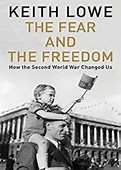Holiday reading 2,3 & 4: Being Wrong plus
I’ve been interested for some time in our capacity for self-deception (including my own), and so was intrigued by a book title, Being Wrong. Kathryn Schulz makes a lively case for being more relaxed about the errors we make, and argues positively that it’s only by risking being wrong that we get to empathise with each other. She has a lot of perceptive things to say about certainty, e.g.
Our dislike of doubt is a kind of emotional agoraphobia. Uncertainty leaves us stranded in a universe that is too big, too open, too ill-defined.
Overall, I think she tries to do too much with the argument, and doesn’t provide us with a strong enough framework for thinking about different kinds of error, but it’s a fine try.
 There is of course a gender angle, though Schulz doesn’t make that much of it. We know that men are far more likely to be confident of their own rightness, and this plays through into the workplace and our reward system. The most PP-relevant section in the book comes from an account Schulz gives of a graduate seminar where a student prefaced her remarks with “I might be going out on a limb here…” According to Schulz, this confession of doubt/acknowledgement of possible error had an impact on the whole atmosphere:
There is of course a gender angle, though Schulz doesn’t make that much of it. We know that men are far more likely to be confident of their own rightness, and this plays through into the workplace and our reward system. The most PP-relevant section in the book comes from an account Schulz gives of a graduate seminar where a student prefaced her remarks with “I might be going out on a limb here…” According to Schulz, this confession of doubt/acknowledgement of possible error had an impact on the whole atmosphere:
Before that moment the prevailing ethos seemed to be a kind of academic one-upmanship, in which the point was to undermine all previous observations. After this comment, though, the room seemed to relax…her classmates were able to contemplate its potential merit instead of rushing to invalidate it. These kinds of disarming, self-deprecating comments are generally considered more typical of the speech patterns of women than men. Not coincidentally they are often criticised as overly timid and self-sabotaging. But I’m not sure that’s the whole story….By moving away from decree and towards inquiry, they set the stage for more open and interesting conversations.
This echoes strongly the comments made to me by a very experienced private sector chairman, on the way women directors enabled his boards to operate as teams pooling ideas rather than competing for their individual proposals. Openness to uncertainty, or at least ambiguity, has its value, including creating an atmosphere at work where people can explore ideas and proposals.
 Next up on the holiday list was Keith Lowe’s The Fear and The Freedom. This is a brilliant account of what happened after WW2, organised not as a conventional history but along a number of themes: martyrhood, utopia planning, universal governance and so on. There’s not much that’s PP-relevant, except for the well-known story of women being pushed back into domestic roles. I finished the book with an overwhelming sense of the cruelty inflicted by nation on nation, notably in the widespread forced expulsions of millions from country after country after the war ended. Reading about the treatment of Korean comfort women – an issue that still has life today – or the widespread raping that went on, including by Allied troops, gave a further big shove to my painful awareness that when it comes to inflicting serious suffering it is 98% men that are responsible – of course recognising that men died and suffered in huge numbers too.
Next up on the holiday list was Keith Lowe’s The Fear and The Freedom. This is a brilliant account of what happened after WW2, organised not as a conventional history but along a number of themes: martyrhood, utopia planning, universal governance and so on. There’s not much that’s PP-relevant, except for the well-known story of women being pushed back into domestic roles. I finished the book with an overwhelming sense of the cruelty inflicted by nation on nation, notably in the widespread forced expulsions of millions from country after country after the war ended. Reading about the treatment of Korean comfort women – an issue that still has life today – or the widespread raping that went on, including by Allied troops, gave a further big shove to my painful awareness that when it comes to inflicting serious suffering it is 98% men that are responsible – of course recognising that men died and suffered in huge numbers too.
Finally Siri Hustvedt’s A Woman Looking at Men Looking at Women. This collection of essays had a tempting title and glittering quotes on its quality. I anticipated a lot of PP-relevant insights, and there is indeed quite a lot on gender. Sadly, I found it so clunky in style, and self-indulgent, that I couldn’t get much out of it. But let’s hear it anyway for willingness to cross disciplinary boundaries.
